-
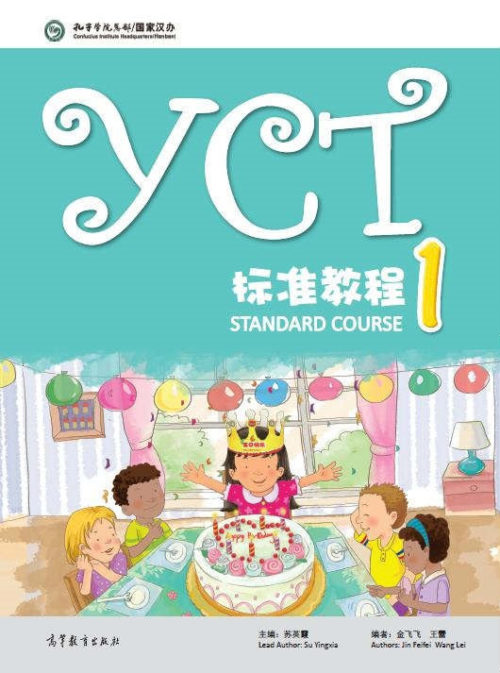 中小学生汉语考试(YCT)是一项国际汉语能力标准化考试,考查汉语非第1语言的中小学生在日常生活和学习中运用汉语的能力。在真题分析的基础上,本着“考教结合”的理念《YCT标准教程(1)》应运而生。 The Youth Chinese Test (YCT) is an international standardised Chinese language proficiency test that tests the ability of primary and secondary school students whose Chinese is not their first language to use Chinese in their daily lives and studies. The YCT Standard Course (1) textbook has been developed based on the analysis of the exam questions and the concept of "teaching and learning together".
中小学生汉语考试(YCT)是一项国际汉语能力标准化考试,考查汉语非第1语言的中小学生在日常生活和学习中运用汉语的能力。在真题分析的基础上,本着“考教结合”的理念《YCT标准教程(1)》应运而生。 The Youth Chinese Test (YCT) is an international standardised Chinese language proficiency test that tests the ability of primary and secondary school students whose Chinese is not their first language to use Chinese in their daily lives and studies. The YCT Standard Course (1) textbook has been developed based on the analysis of the exam questions and the concept of "teaching and learning together". -
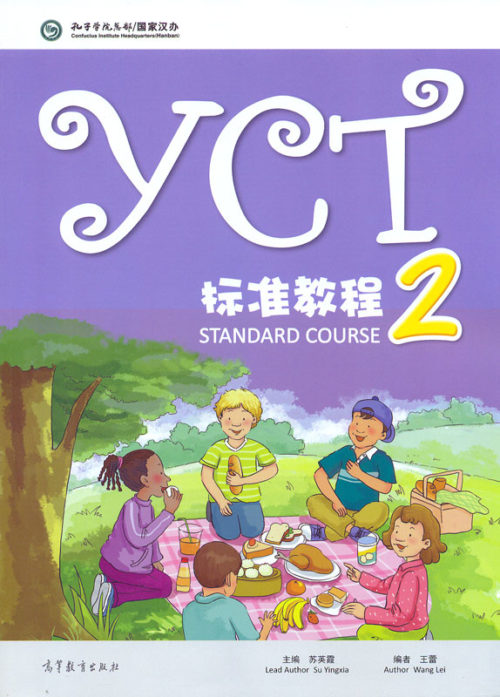 中小学生汉语考试(YCT)是一项国际汉语能力标准化考试,考查汉语非第1语言的中小学生在日常生活和学习中运用汉语的能力。在真题分析的基础上,本着“考教结合”的理念《YCT标准教程(2)》应运而生。 The Youth Chinese Test (YCT) is an international standardised Chinese language proficiency test that tests the ability of primary and secondary school students whose Chinese is not their first language to use Chinese in their daily lives and studies. The YCT Standard Course (2) textbook has been developed based on the analysis of the exam questions and the concept of "teaching and learning together".
中小学生汉语考试(YCT)是一项国际汉语能力标准化考试,考查汉语非第1语言的中小学生在日常生活和学习中运用汉语的能力。在真题分析的基础上,本着“考教结合”的理念《YCT标准教程(2)》应运而生。 The Youth Chinese Test (YCT) is an international standardised Chinese language proficiency test that tests the ability of primary and secondary school students whose Chinese is not their first language to use Chinese in their daily lives and studies. The YCT Standard Course (2) textbook has been developed based on the analysis of the exam questions and the concept of "teaching and learning together". -
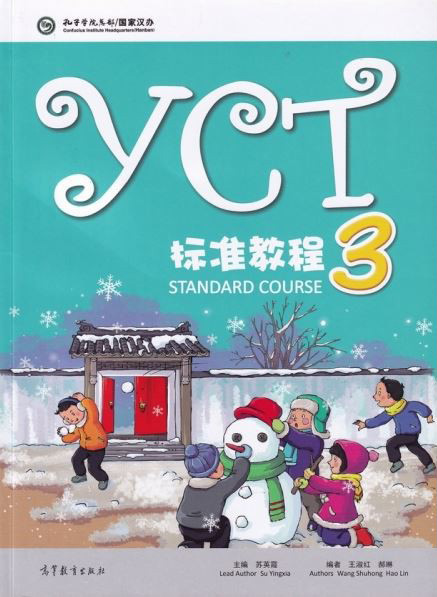 中小学生汉语考试(YCT)是一项国际汉语能力标准化考试,考查汉语非第1语言的中小学生在日常生活和学习中运用汉语的能力。在真题分析的基础上,本着“考教结合”的理念《YCT标准教程(3)》应运而生。 The Youth Chinese Test (YCT) is an international standardised Chinese language proficiency test that tests the ability of primary and secondary school students whose Chinese is not their first language to use Chinese in their daily lives and studies. The YCT Standard Course (3) textbook has been developed based on the analysis of the exam questions and the concept of "teaching and learning together".
中小学生汉语考试(YCT)是一项国际汉语能力标准化考试,考查汉语非第1语言的中小学生在日常生活和学习中运用汉语的能力。在真题分析的基础上,本着“考教结合”的理念《YCT标准教程(3)》应运而生。 The Youth Chinese Test (YCT) is an international standardised Chinese language proficiency test that tests the ability of primary and secondary school students whose Chinese is not their first language to use Chinese in their daily lives and studies. The YCT Standard Course (3) textbook has been developed based on the analysis of the exam questions and the concept of "teaching and learning together". -
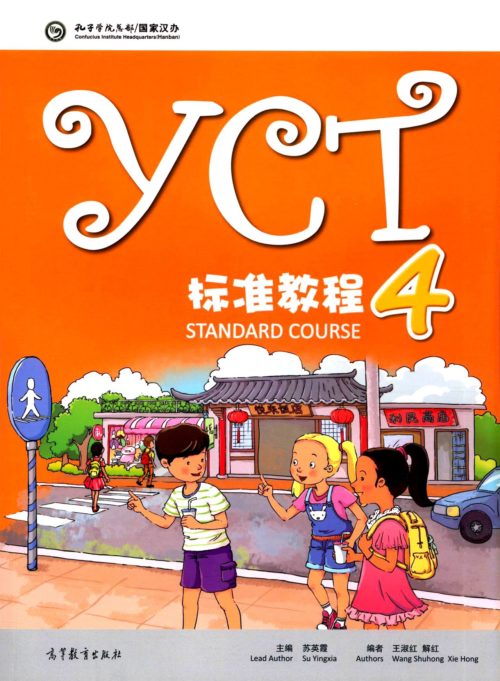 中小学生汉语考试(YCT)是一项国际汉语能力标准化考试,考查汉语非第1语言的中小学生在日常生活和学习中运用汉语的能力。在真题分析的基础上,本着“考教结合”的理念《YCT标准教程(4)》应运而生。 The Youth Chinese Test (YCT) is an international standardised Chinese language proficiency test that tests the ability of primary and secondary school students whose Chinese is not their first language to use Chinese in their daily lives and studies. The YCT Standard Course (4) textbook has been developed based on the analysis of the exam questions and the concept of "teaching and learning together".
中小学生汉语考试(YCT)是一项国际汉语能力标准化考试,考查汉语非第1语言的中小学生在日常生活和学习中运用汉语的能力。在真题分析的基础上,本着“考教结合”的理念《YCT标准教程(4)》应运而生。 The Youth Chinese Test (YCT) is an international standardised Chinese language proficiency test that tests the ability of primary and secondary school students whose Chinese is not their first language to use Chinese in their daily lives and studies. The YCT Standard Course (4) textbook has been developed based on the analysis of the exam questions and the concept of "teaching and learning together". -
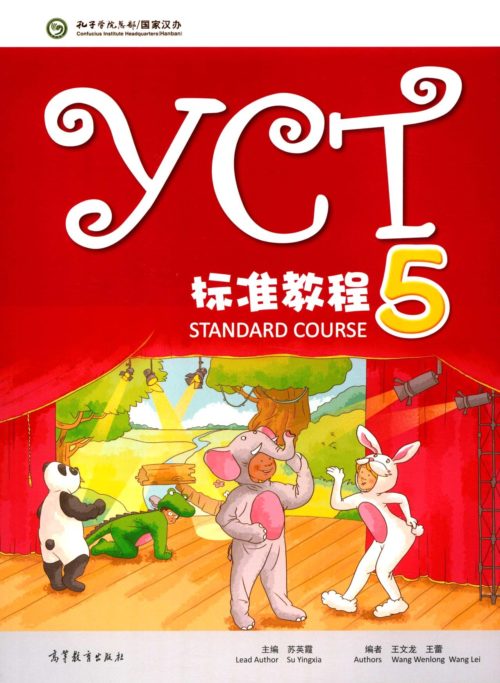 中小学生汉语考试(YCT)是一项国际汉语能力标准化考试,考查汉语非第1语言的中小学生在日常生活和学习中运用汉语的能力。在真题分析的基础上,本着“考教结合”的理念《YCT标准教程(5)》应运而生。 The Youth Chinese Test (YCT) is an international standardised Chinese language proficiency test that tests the ability of primary and secondary school students whose Chinese is not their first language to use Chinese in their daily lives and studies. The YCT Standard Course (5) textbook has been developed based on the analysis of the exam questions and the concept of "teaching and learning together".
中小学生汉语考试(YCT)是一项国际汉语能力标准化考试,考查汉语非第1语言的中小学生在日常生活和学习中运用汉语的能力。在真题分析的基础上,本着“考教结合”的理念《YCT标准教程(5)》应运而生。 The Youth Chinese Test (YCT) is an international standardised Chinese language proficiency test that tests the ability of primary and secondary school students whose Chinese is not their first language to use Chinese in their daily lives and studies. The YCT Standard Course (5) textbook has been developed based on the analysis of the exam questions and the concept of "teaching and learning together". -
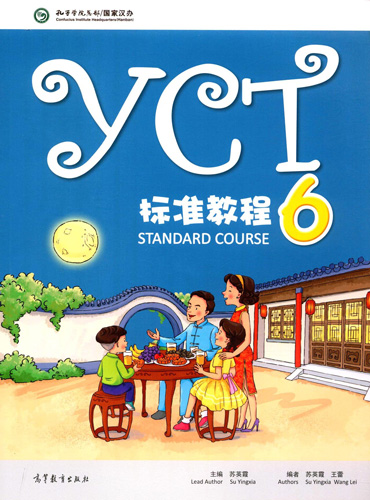 中小学生汉语考试(YCT)是一项国际汉语能力标准化考试,考查汉语非第1语言的中小学生在日常生活和学习中运用汉语的能力。在真题分析的基础上,本着“考教结合”的理念《YCT标准教程(6)》应运而生。 The Youth Chinese Test (YCT) is an international standardised Chinese language proficiency test that tests the ability of primary and secondary school students whose Chinese is not their first language to use Chinese in their daily lives and studies. The YCT Standard Course (6) textbook has been developed based on the analysis of the exam questions and the concept of "teaching and learning together".
中小学生汉语考试(YCT)是一项国际汉语能力标准化考试,考查汉语非第1语言的中小学生在日常生活和学习中运用汉语的能力。在真题分析的基础上,本着“考教结合”的理念《YCT标准教程(6)》应运而生。 The Youth Chinese Test (YCT) is an international standardised Chinese language proficiency test that tests the ability of primary and secondary school students whose Chinese is not their first language to use Chinese in their daily lives and studies. The YCT Standard Course (6) textbook has been developed based on the analysis of the exam questions and the concept of "teaching and learning together". -
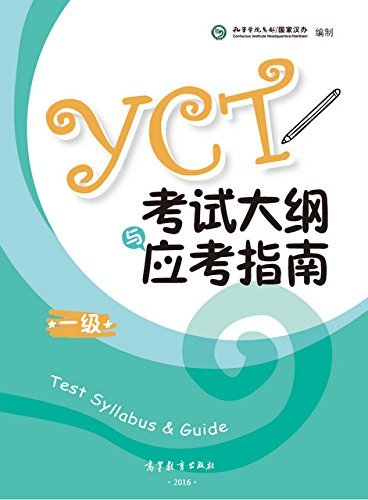 中小学生汉语考试(YCT)自2010年实施以来,更加关注汉语非第一语言的学习者综合能力的培养,多元智能发展的培养。《YCT考试大纲与应考指南》是基于《YCT考试大纲(2009版)》的一次修订。本次修订继续遵循“考教结合”的理念,根据主题式教学和任务型教学的理论及方法,以交际话题和语言任务为引领,重点描述学生在每一级别的词语、语言点限定内“能做(can do)”什么,建议在实际教学中,整体培养学习者的交际能力和语言综合运用能力。 Since its implementation in 2010, the Youth Chinese Test (YCT) has paid more attention to the cultivation of comprehensive abilities and the development of multiple intelligences for learners whose Chinese is not their first language. The YCT Syllabus and Examination Guide is a revision of the YCT Syllabus (2009 Edition). The revision continues to follow the concept of 'teaching and learning together', and is based on the theories and methods of topic-based teaching and task-based teaching, using communicative topics and language tasks as a guide. It is recommended that in practice, learners develop their communicative competence and their ability to use the language as a whole.
中小学生汉语考试(YCT)自2010年实施以来,更加关注汉语非第一语言的学习者综合能力的培养,多元智能发展的培养。《YCT考试大纲与应考指南》是基于《YCT考试大纲(2009版)》的一次修订。本次修订继续遵循“考教结合”的理念,根据主题式教学和任务型教学的理论及方法,以交际话题和语言任务为引领,重点描述学生在每一级别的词语、语言点限定内“能做(can do)”什么,建议在实际教学中,整体培养学习者的交际能力和语言综合运用能力。 Since its implementation in 2010, the Youth Chinese Test (YCT) has paid more attention to the cultivation of comprehensive abilities and the development of multiple intelligences for learners whose Chinese is not their first language. The YCT Syllabus and Examination Guide is a revision of the YCT Syllabus (2009 Edition). The revision continues to follow the concept of 'teaching and learning together', and is based on the theories and methods of topic-based teaching and task-based teaching, using communicative topics and language tasks as a guide. It is recommended that in practice, learners develop their communicative competence and their ability to use the language as a whole. -
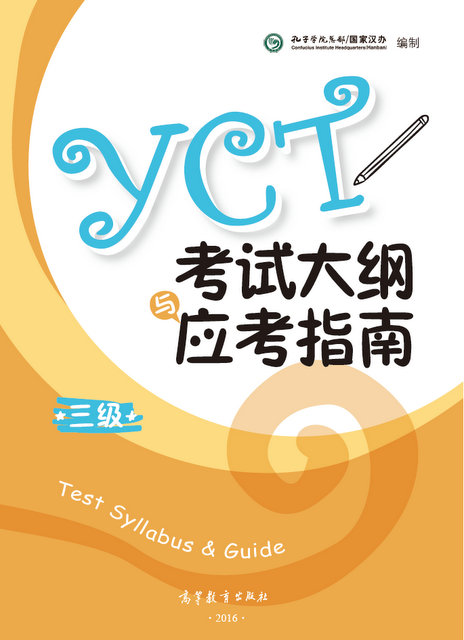 中小学生汉语考试(YCT)自2010年实施以来,更加关注汉语非第一语言的学习者综合能力的培养,多元智能发展的培养。《YCT考试大纲与应考指南》是基于《YCT考试大纲(2009版)》的一次修订。本次修订继续遵循“考教结合”的理念,根据主题式教学和任务型教学的理论及方法,以交际话题和语言任务为引领,重点描述学生在每一级别的词语、语言点限定内“能做(can do)”什么,建议在实际教学中,整体培养学习者的交际能力和语言综合运用能力。 Since its implementation in 2010, the Youth Chinese Test (YCT) has paid more attention to the cultivation of comprehensive abilities and the development of multiple intelligences for learners whose Chinese is not their first language. The YCT Syllabus and Examination Guide is a revision of the YCT Syllabus (2009 Edition). The revision continues to follow the concept of 'teaching and learning together', and is based on the theories and methods of topic-based teaching and task-based teaching, using communicative topics and language tasks as a guide. It is recommended that in practice, learners develop their communicative competence and their ability to use the language as a whole.
中小学生汉语考试(YCT)自2010年实施以来,更加关注汉语非第一语言的学习者综合能力的培养,多元智能发展的培养。《YCT考试大纲与应考指南》是基于《YCT考试大纲(2009版)》的一次修订。本次修订继续遵循“考教结合”的理念,根据主题式教学和任务型教学的理论及方法,以交际话题和语言任务为引领,重点描述学生在每一级别的词语、语言点限定内“能做(can do)”什么,建议在实际教学中,整体培养学习者的交际能力和语言综合运用能力。 Since its implementation in 2010, the Youth Chinese Test (YCT) has paid more attention to the cultivation of comprehensive abilities and the development of multiple intelligences for learners whose Chinese is not their first language. The YCT Syllabus and Examination Guide is a revision of the YCT Syllabus (2009 Edition). The revision continues to follow the concept of 'teaching and learning together', and is based on the theories and methods of topic-based teaching and task-based teaching, using communicative topics and language tasks as a guide. It is recommended that in practice, learners develop their communicative competence and their ability to use the language as a whole. -
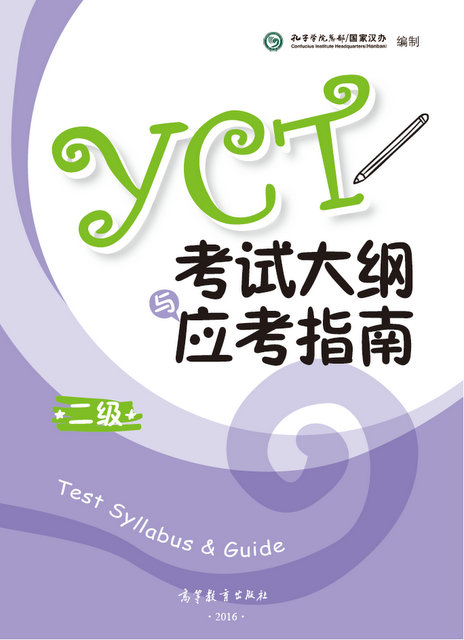 中小学生汉语考试(YCT)自2010年实施以来,更加关注汉语非第一语言的学习者综合能力的培养,多元智能发展的培养。《YCT考试大纲与应考指南》是基于《YCT考试大纲(2009版)》的一次修订。本次修订继续遵循“考教结合”的理念,根据主题式教学和任务型教学的理论及方法,以交际话题和语言任务为引领,重点描述学生在每一级别的词语、语言点限定内“能做(can do)”什么,建议在实际教学中,整体培养学习者的交际能力和语言综合运用能力。 Since its implementation in 2010, the Youth Chinese Test (YCT) has paid more attention to the cultivation of comprehensive abilities and the development of multiple intelligences for learners whose Chinese is not their first language. The YCT Syllabus and Examination Guide is a revision of the YCT Syllabus (2009 Edition). The revision continues to follow the concept of 'teaching and learning together', and is based on the theories and methods of topic-based teaching and task-based teaching, using communicative topics and language tasks as a guide. It is recommended that in practice, learners develop their communicative competence and their ability to use the language as a whole.
中小学生汉语考试(YCT)自2010年实施以来,更加关注汉语非第一语言的学习者综合能力的培养,多元智能发展的培养。《YCT考试大纲与应考指南》是基于《YCT考试大纲(2009版)》的一次修订。本次修订继续遵循“考教结合”的理念,根据主题式教学和任务型教学的理论及方法,以交际话题和语言任务为引领,重点描述学生在每一级别的词语、语言点限定内“能做(can do)”什么,建议在实际教学中,整体培养学习者的交际能力和语言综合运用能力。 Since its implementation in 2010, the Youth Chinese Test (YCT) has paid more attention to the cultivation of comprehensive abilities and the development of multiple intelligences for learners whose Chinese is not their first language. The YCT Syllabus and Examination Guide is a revision of the YCT Syllabus (2009 Edition). The revision continues to follow the concept of 'teaching and learning together', and is based on the theories and methods of topic-based teaching and task-based teaching, using communicative topics and language tasks as a guide. It is recommended that in practice, learners develop their communicative competence and their ability to use the language as a whole. -
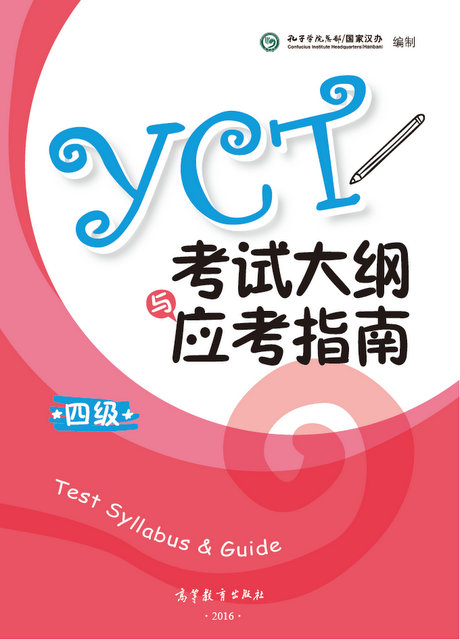 中小学生汉语考试(YCT)自2010年实施以来,更加关注汉语非第一语言的学习者综合能力的培养,多元智能发展的培养。《YCT考试大纲与应考指南》是基于《YCT考试大纲(2009版)》的一次修订。本次修订继续遵循“考教结合”的理念,根据主题式教学和任务型教学的理论及方法,以交际话题和语言任务为引领,重点描述学生在每一级别的词语、语言点限定内“能做(can do)”什么,建议在实际教学中,整体培养学习者的交际能力和语言综合运用能力。 Since its implementation in 2010, the Youth Chinese Test (YCT) has paid more attention to the cultivation of comprehensive abilities and the development of multiple intelligences for learners whose Chinese is not their first language. The YCT Syllabus and Examination Guide is a revision of the YCT Syllabus (2009 Edition). The revision continues to follow the concept of 'teaching and learning together', and is based on the theories and methods of topic-based teaching and task-based teaching, using communicative topics and language tasks as a guide. It is recommended that in practice, learners develop their communicative competence and their ability to use the language as a whole.
中小学生汉语考试(YCT)自2010年实施以来,更加关注汉语非第一语言的学习者综合能力的培养,多元智能发展的培养。《YCT考试大纲与应考指南》是基于《YCT考试大纲(2009版)》的一次修订。本次修订继续遵循“考教结合”的理念,根据主题式教学和任务型教学的理论及方法,以交际话题和语言任务为引领,重点描述学生在每一级别的词语、语言点限定内“能做(can do)”什么,建议在实际教学中,整体培养学习者的交际能力和语言综合运用能力。 Since its implementation in 2010, the Youth Chinese Test (YCT) has paid more attention to the cultivation of comprehensive abilities and the development of multiple intelligences for learners whose Chinese is not their first language. The YCT Syllabus and Examination Guide is a revision of the YCT Syllabus (2009 Edition). The revision continues to follow the concept of 'teaching and learning together', and is based on the theories and methods of topic-based teaching and task-based teaching, using communicative topics and language tasks as a guide. It is recommended that in practice, learners develop their communicative competence and their ability to use the language as a whole. -
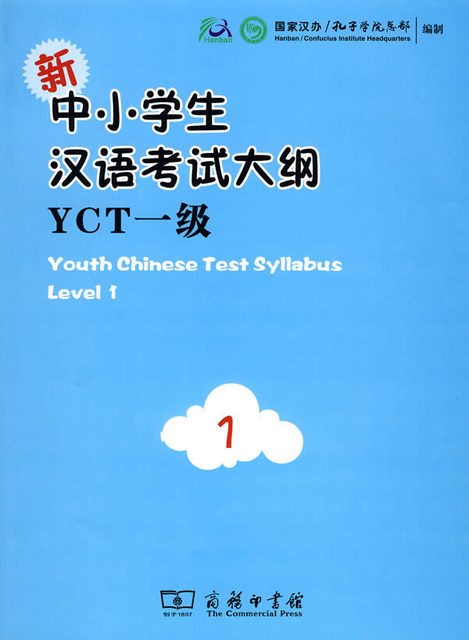 新中小学生汉语考试(YCT)是一项国际汉语能力标准化考试,考查汉语非第一语言的中小学生日常生活和学习中运用汉语的能力。新YCT分笔试和口试两部分。笔试包括YCT(一级)、YCT(二级)、YCT(三级)、YCT(四级);口试包括YCT(初级)和YCT(中级)。 YCT(一级)考查考生的日常汉语应用能力。通过YCT(一级)的考生可以理解并使用最常用的汉语词语和句子,具备进一学习汉语的能力。 The Youth Chinese Test (YCT) is an international standardised Chinese language proficiency test that tests the ability of primary and secondary school students whose Chinese is not their first language to use Chinese in their daily lives and studies. The new YCT has two parts: a written test and an oral test. The written test includes YCT (Level 1), YCT (Level 2), YCT (Level 3) and YCT (Level 4); the oral test includes YCT (Elementary) and YCT (Intermediate). YCT (Level 1) tests candidates' ability to use Chinese in everyday life. Candidates who pass YCT (Level 1) can understand and use the most commonly used Chinese words and sentences and have the ability to learn Chinese further.
新中小学生汉语考试(YCT)是一项国际汉语能力标准化考试,考查汉语非第一语言的中小学生日常生活和学习中运用汉语的能力。新YCT分笔试和口试两部分。笔试包括YCT(一级)、YCT(二级)、YCT(三级)、YCT(四级);口试包括YCT(初级)和YCT(中级)。 YCT(一级)考查考生的日常汉语应用能力。通过YCT(一级)的考生可以理解并使用最常用的汉语词语和句子,具备进一学习汉语的能力。 The Youth Chinese Test (YCT) is an international standardised Chinese language proficiency test that tests the ability of primary and secondary school students whose Chinese is not their first language to use Chinese in their daily lives and studies. The new YCT has two parts: a written test and an oral test. The written test includes YCT (Level 1), YCT (Level 2), YCT (Level 3) and YCT (Level 4); the oral test includes YCT (Elementary) and YCT (Intermediate). YCT (Level 1) tests candidates' ability to use Chinese in everyday life. Candidates who pass YCT (Level 1) can understand and use the most commonly used Chinese words and sentences and have the ability to learn Chinese further. -
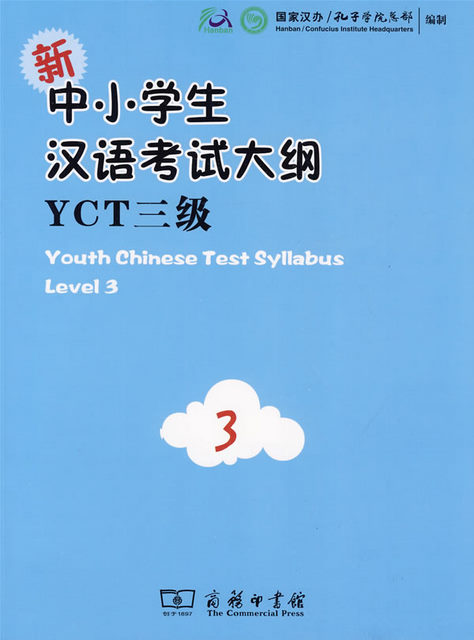 新中小学生汉语考试(YCT)是一项国际汉语能力标准化考试,考查汉语非第一语言的中小学生日常生活和学习中运用汉语的能力。新YCT分笔试和口试两部分。笔试包括YCT(一级)、YCT(二级)、YCT(三级)、YCT(四级);口试包括YCT(初级)和YCT(中级)。 YCT(三级)考查考生的日常汉语应用能力,它对应于《国际汉语能力标准》二级、《欧洲语言共同参考柜架(CEF)》A2级。通过YCT(三级)的考生可以用汉语就熟悉的日常话题 进行简单而直接的交流,达到初级汉语优等水平。 The Youth Chinese Test (YCT) is an international standardised Chinese language proficiency test that tests the ability of primary and secondary school students whose Chinese is not their first language to use Chinese in their daily lives and studies. The new YCT has two parts: a written test and an oral test. The written test includes YCT (Level 1), YCT (Level 2), YCT (Level 3) and YCT (Level 4); the oral test includes YCT (Elementary) and YCT (Intermediate). YCT (Level 3) tests candidates' ability to use Chinese in everyday situations and corresponds to the International Chinese Language Proficiency Standard Level 2 and the Common European Framework of Reference for Languages (CEF) Level A2. Candidates who pass the YCT (Level 3) can communicate in Chinese in a simple and direct way on familiar everyday topics, and reach the level of primary Chinese proficiency.
新中小学生汉语考试(YCT)是一项国际汉语能力标准化考试,考查汉语非第一语言的中小学生日常生活和学习中运用汉语的能力。新YCT分笔试和口试两部分。笔试包括YCT(一级)、YCT(二级)、YCT(三级)、YCT(四级);口试包括YCT(初级)和YCT(中级)。 YCT(三级)考查考生的日常汉语应用能力,它对应于《国际汉语能力标准》二级、《欧洲语言共同参考柜架(CEF)》A2级。通过YCT(三级)的考生可以用汉语就熟悉的日常话题 进行简单而直接的交流,达到初级汉语优等水平。 The Youth Chinese Test (YCT) is an international standardised Chinese language proficiency test that tests the ability of primary and secondary school students whose Chinese is not their first language to use Chinese in their daily lives and studies. The new YCT has two parts: a written test and an oral test. The written test includes YCT (Level 1), YCT (Level 2), YCT (Level 3) and YCT (Level 4); the oral test includes YCT (Elementary) and YCT (Intermediate). YCT (Level 3) tests candidates' ability to use Chinese in everyday situations and corresponds to the International Chinese Language Proficiency Standard Level 2 and the Common European Framework of Reference for Languages (CEF) Level A2. Candidates who pass the YCT (Level 3) can communicate in Chinese in a simple and direct way on familiar everyday topics, and reach the level of primary Chinese proficiency.